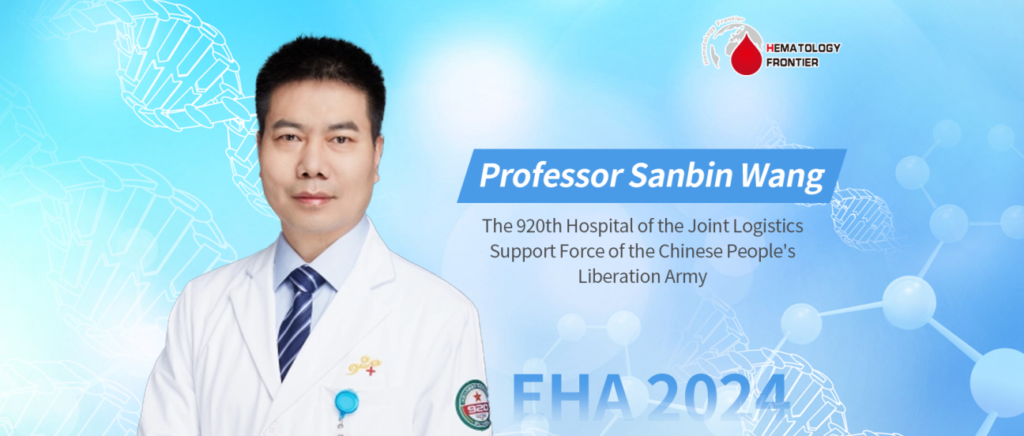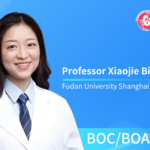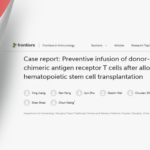
The 29th European Hematology Association (EHA) Annual Congress was held in Madrid, Spain, from June 13 to 16, 2024. As the largest international conference in the field of hematology in Europe, it attracts experts and scholars worldwide to share and discuss innovative ideas and the latest scientific and clinical research achievements in hematology. At this year's EHA Congress, three studies from Professor Sanbin Wang's team at The 920th Hospital of the Joint Logistics Support Force of the Chinese People's Liberation Army were selected as posters (abstracts P544, 965, and 420), exploring treatment advancements in AML, RRMM, and r/r B-ALL, respectively. Oncology Frontier-Hematology Frontier invited Professor Sanbin Wang to share and interpret the content and significance of these studies.1. VENETOCLAX PLUS AZACITIDINE, CYTARABINE, ACLARUBICIN AND G-CSF (VA-CAG REGIMEN) FOR NEWLY DIAGNOSED PATIENTS WITH ACUTE MYELOID LEUKEMIA: UPDATE OF A PROSPECTIVE, MULTICENTER, PHASE 2 CLINICAL TRIAL
Abstract Number: P544
Study Overview
This prospective, multicenter, single-arm Phase II clinical trial included 67 newly diagnosed AML patients aged 18-65, treated with the VA-CAG regimen (Venetoclax/Azacitidine-Cytarabine/Aclarubicin/G-CSF). The specific dosages were: Venetoclax (100 mg on day 1, 200 mg on day 2, 400 mg on days 3-21, orally), Azacitidine (75 mg/m2 on days 1-7, subcutaneously), Cytarabine (10 mg/m2 on days 1-7, every 12 hours, subcutaneously), Aclarubicin (12 mg/m2 on days 1, 3, 5, 7, intravenously), and G-CSF (5 µg/kg on days 1-7). The primary endpoints were complete remission (CR) and safety. Results showed:
- The overall response rate (ORR) was 98.5% (66/67), with a CR rate of 94% (63/67) and partial remission (PR) rate of 4.5% (3/67). Among the 63 CR patients, 52 (82.5%) had negative minimal residual disease (MRD).
- The most common grade 4 adverse events (AEs) included neutropenia (97%), thrombocytopenia (85.1%), and infection (14.9%). There were 11 cases of breakthrough fungal infections and three cases of sepsis, but all AEs were managed successfully without treatment-related deaths.
- With a median follow-up of six months, the overall survival (OS) rate was 92.5%, with 14 patients subsequently receiving allo-HSCT.
Expert Commentary
Professor Sanbin Wang: The remission rate for AML remains low, with classic DA regimen (Daunorubicin/Cytarabine) achieving a remission rate of about 60-70%. The emergence of BCL-2 inhibitor Venetoclax has increased the remission rate to 60-70% in elderly AML patients using the Venetoclax and Azacitidine (VA) regimen, typically used for elderly, unfit, or high-risk AML patients. Whether it can be used for low-risk AML or further improve remission rates is an area of active research. Our study combined VA with CAG (Cytarabine/Aclarubicin/G-CSF) in newly diagnosed AML patients aged 18-65, achieving a CR rate of 94% and an ORR of 98.5%. This indicates that the VA-CAG regimen is effective for treating young, newly diagnosed AML patients.
2. SAFETY AND EFFICACY ANALYSIS OF GPRC5D-TARGETED CAR-T CELL THERAPY IN RELAPSED/REFRACTORY MULTIPLE MYELOMA PATIENTS
Abstract Number: P965
Study Overview
This investigator-initiated, single-center, single-arm Phase I clinical study included 10 RRMM patients who received a single infusion of autologous GPRC5D CAR-T cells, including three patients previously treated with BCMA CAR-T cells. The study aimed to evaluate the efficacy and safety of autologous GPRC5D CAR-T cells in RRMM treatment. Results showed:
- Nine out of 10 patients achieved remission, with an ORR of 90%. CR was achieved in six patients (60%), PR in three patients (30%), and no response (NR) in one patient who was GPRC5D-negative.
- Regarding safety, 90% (9/10) of patients experienced cytokine release syndrome (CRS), all of which were grade 1. Only hematologic toxicity was observed as grade 2 or higher adverse reactions, with no dose-limiting toxicity (DLT) or neurotoxicity events. This study suggests that GPRC5D-targeted CAR-T cell therapy is safe and effective for treating RRMM, especially in patients resistant to BCMA CAR-T therapy.
Expert Commentary
Professor Sanbin Wang: Multiple myeloma (MM) is an incurable disease, with many patients experiencing relapse and requiring multiple lines of therapy. Current treatment options include proteasome inhibitors (PIs), immunomodulatory drugs (IMiDs), CD38 monoclonal antibody Daratumumab, nuclear export protein inhibitors, bispecific antibodies, antibody-drug conjugates (ADCs), autologous stem cell transplantation (ASCT), and CAR-T cell therapy, particularly for RRMM patients. BCMA is a common CAR-T target in MM treatment, but some patients do not express BCMA or relapse after BCMA CAR-T therapy, necessitating alternative targets. GPRC5D is an independent target from BCMA and a good alternative.
Our study included 10 RRMM patients treated with GPRC5D-targeted CAR-T cells, achieving a PR or better in nine patients, a promising result. GPRC5D-positive patients showed relatively better efficacy, and the treatment was safe, making it a viable option for RRMM therapy.
3. AUTOLOGOUS CD19-DIRECTED CAR T CELLS PRODUCED BY NOVEL BEDSIDE-MANUFACTURE PLATFORM EXHIBIT SAFETY AND EFFICACY IN R/R B-ALL
Abstract Number: P420
Study Overview
CD19 CAR-T cells are effective in treating r/r B-ALL and various autoimmune diseases, but the complex production process relies on CAR-T centers, making the treatment expensive and time-consuming. Reducing production time and cost is crucial.
This study included 10 r/r B-ALL patients, with CD19 CAR-T cells (OlyCAR-19) produced using the OlyCAR Platform within two hours. After collecting the patients’ peripheral blood mononuclear cells (PBMCs), they underwent intensified lymphodepletion treatment (Fludarabine 30-50 mg/m2/d + Cyclophosphamide 2000 mg/m2/d). Patients then received a single infusion of OlyCAR-19 (1×10^6 cells/kg or 3×10^6 cells/kg). Results showed:
- Regarding safety, 70% (7/10) of patients experienced CRS, all grade 1, with no grade 2 or higher CRS, ICANS, DLT, or treatment-related deaths.
- Regarding efficacy, 70% (7/10) of patients achieved CR within the first month, with one patient maintaining CR for over six months. Two patients were lost to follow-up at one and three months, two relapsed 2-6 months post-CAR-T therapy, one underwent allo-HSCT, and one entered another clinical trial. The study demonstrates that OlyCAR-19 is safe and effective for r/r B-ALL, significantly reducing production time and increasing CAR-T accessibility.
Expert Commentary
Professor Sanbin Wang: CAR-T therapy has made significant strides in treating hematologic malignancies, but improvements are still needed. The production time for CAR-T cells is lengthy, typically taking 2-3 weeks or even 3-4 weeks from T cell collection to CAR-T product preparation. Reducing production time is essential. Additionally, CAR-T therapy is expensive, limiting accessibility. Our study utilized the OlyCAR Platform to produce CD19 CAR-T cells within hours, significantly shortening the production time. We used new techniques, such as specific viral vector targeting and rapid transfection. OlyCAR Platform reduced CAR-T preparation time to hours, enabling CAR-T infusion the next day and in vivo expansion. This method appears feasible, reducing production time and controlling costs. In terms of efficacy, seven out of 10 patients achieved CR, facilitating subsequent bridging transplantation.
Professor Sanbin Wang
- Chief Physician, PhD Supervisor at the 920th Hospital of the Joint Logistics Support Force of the Chinese People’s Liberation Army
- Member of the Hematology Physician Branch of the Chinese Medical Doctor Association
- Member of the Hematology Branch of the Chinese Association of Integrative Medicine
- Member of the Cell Therapy Group of the Hematologic Oncology Committee of the Chinese Anti-Cancer Association
- Member of the Integrative Hematology Committee of the Integrative Medicine Physician Branch of the Chinese Medical Doctor Association
- Member of the Hematology Professional Committee of the Military Medical Science and Technology Committee
- Chair of the Hematology Society of Yunnan Province
- Vice Chair of the Hematology Physician Branch of the Yunnan Medical Doctor Association
- Recipient of the First Prize of the Science and Technology Award from the Chinese Society of Experimental Animals, two Third Prizes of the Yunnan Province Science and Technology Progress Award, and one First Prize of the Kunming Science and Technology Project Award. Led a major special research project in the biomedicine field funded by the Yunnan Science and Technology Department. Published over 40 academic papers as the first or corresponding author in journals such as JCO and CCR. Main research interests: (1) Hematopoietic stem cell transplantation; (2) Treatment of HIV-related hematologic diseases; (3) Universal CAR-T therapy for malignant hematologic diseases; (4) Gene therapy for transfusion-dependent β-thalassemia.


